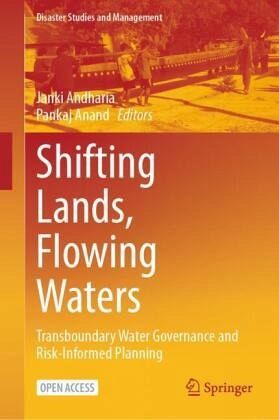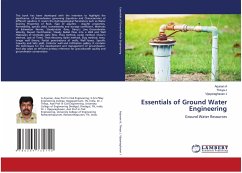Nicht lieferbar

Shifting Lands, Flowing Waters
Transboundary Water Governance and Risk-Informed Planning
Herausgegeben: Andharia, Janki; Anand, Pankaj
Versandkostenfrei!
Nicht lieferbar
This is an open access book that focuses on issues around rivers which feed more than one country at a time, changing their course and flow. It emphasizes the need for more efficient and transparent risk-informed water governance across South Asia with a special focus on river basins in the region. Researchers and practitioners critically examine one or more themes such as economy, society and culture in transboundary resource sharing: conflict and cooperation, nature of challenges, everyday dynamics and formal and informal responses; contemporary water governance framework in South Asia (refl...
This is an open access book that focuses on issues around rivers which feed more than one country at a time, changing their course and flow. It emphasizes the need for more efficient and transparent risk-informed water governance across South Asia with a special focus on river basins in the region. Researchers and practitioners critically examine one or more themes such as economy, society and culture in transboundary resource sharing: conflict and cooperation, nature of challenges, everyday dynamics and formal and informal responses; contemporary water governance framework in South Asia (reflecting on the issues of justice and rights of riparian communities); transboundary disaster governance and policies that relate to resource management; water governance networks and alliances in South Asia; political economy of communities depended on transboundary rivers; risk-informed planning and governance for transboundary resources management (implications for at-risk populations like women, youth and children, fisherfolk, indigenous communities); policies and engagement at national level between South Asian countries on risk-informed governance.
The book acknowledges that policies in South Asia need to deepen their agenda towards just and equitable sharing of water resources across the riparian regions, with an inclusive and people-centred approach of decision-making. For this purpose, it brings forth an understanding of the perspectives of different stakeholders for bridging gaps and facilitating a constructive dialogue for the betterment of the marginalized and vulnerable water-dependent groups. The book is a rich resource for researchers as well as NGOs and policy makers working on issues of water governance, disaster governance, trans-boundary issues, community resilience and so on.
The book acknowledges that policies in South Asia need to deepen their agenda towards just and equitable sharing of water resources across the riparian regions, with an inclusive and people-centred approach of decision-making. For this purpose, it brings forth an understanding of the perspectives of different stakeholders for bridging gaps and facilitating a constructive dialogue for the betterment of the marginalized and vulnerable water-dependent groups. The book is a rich resource for researchers as well as NGOs and policy makers working on issues of water governance, disaster governance, trans-boundary issues, community resilience and so on.













